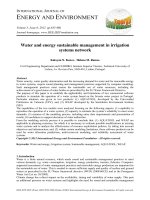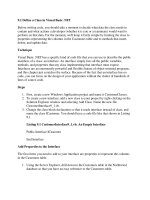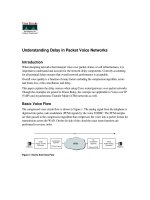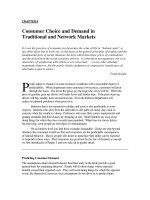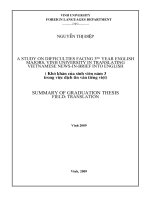Finnfund in brief ENG net
Bạn đang xem bản rút gọn của tài liệu. Xem và tải ngay bản đầy đủ của tài liệu tại đây (940.23 KB, 20 trang )
Finnfund in brief
Finnfund in brief
• Finnish Fund for Industrial Cooperation Ltd. (Finnfund)
– development finance institution
• State of Finland 93,4%, Finnvera Plc 6.5%, Confederation of
Finnish Industries EK 0.1%
• Founded in 1980
• Office in Helsinki, staff of 58 persons
• Member of European Development Finance Institutions (EDFI)
• Risk capital for projects in developing countries and Russia
• Investment criteria include:
- profitability
- social and environmental responsibility
- development impacts
30.6.2016
2
Finnfund in numbers 31 December 2015
Shareholders’ capital
EUR 251 million
Portfolio
EUR 369 million
Portfolio and undisbursed
commitments (at original value)
EUR 602 million
Total assets
EUR 377 million
Number of investments
160
Number of investment countries
33
30.6.2016
3
Finnfund’s target countries by income level
30.6.2016
4
What does Finnfund finance?
• Profitable private projects
- establishment or additional investments
- from small and medium-sized companies to large
companies
- in different sectors
• Positive development and environmental impacts
• Finnish interest
• In developing countries and Russia
30.6.2016
5
Finnish interest
• Finnish partner
• Long-term partnership
– e.g. subcontractor, raw material producer,
long-term customer
• Transfer of Finnish technology
• Significant positive environmental impacts
– e.g. renewable energy and energy efficiency
• In low-income countries also cofinancing with other
development finance institutions
30.6.2016
6
What is Finnfund’s role?
•
•
•
•
•
•
Financial investor with minority stake, EUR 1 - 10 million
Long-term investor
Sharing country risks
Sharing political risks
Expert of development financing
Partner of the project sponsor with industry knowledge
30.6.2016
7
Financial instruments
• Equity
- risk-sharing as a minority shareholder
• Mezzanine
- subordinated and convertible loans
• Loans
- medium to long-term investment loans
• Guarantees to local financiers
30.6.2016
8
Environmental and social policy
Key issues when assessing
potential investments
Benefits of environmental and
social sustainability
• Economic, environmental and
social sustainability
• Creation of positive
environmental and social
impacts
• Respect and promotion of
human rights
• Improved operational and
financial performance
• Guard against unforeseen risks
and impacts
• Competitive advantage
• Enhanced community support
30.6.2016
9
Assessing E&S impacts and risks
Tools
Client to commit to
–
–
–
–
–
–
–
–
–
Finnfund’s E&S expertise
National legislation
International standards (IFC
Performance Standards and the related
Environmental, Health & Safety
Guidelines)
Other relevant sector specific standards
(e.g. ISO, FSC)
Common guidance developed by
European DFIs
E&S site visit (due diligence)
Information and materials provided by
the client
Support during implementation
30.6.2016
–
–
–
Developing adequate E&S
assessments
Implementation of an E&S Action Plan,
when necessary
Providing adequate E&S information
Obtaining a good understanding of the
applicable international E&S standards,
as well as national and local legislation
The aim is to develop the project in line
with international standards and
guidance.
10
Environmental and social sustainability
in the financing process
Familiarisation
with the project
• Finnfund introduces its
environmental and social
principles to the project
company
• The project company provides
the initial information used in
the assessment of the project
• Finnfund plans the environmental and social due
diligence taking into account
the anticipated impacts and
risks.
30.6.2016
Preparing the
investment
proposal
• Obtaining additional information (e.g. with questionnaires)
and site visits
• Finnfund’s advisers analyse
the information, compare the
project to the requirements of
international guidelines and
standards, and identify
possible areas of improvement
• Finnfund’s advisers discuss
the results of their assessment
and, where necessary, draft a
corrective action plan together
with the project company.
A review is prepared to support
the investment proposal.
Legal
agreements and
disbursement
• Environmental and social
covenants and undertakings
are agreed upon (including
conditions precedent for
disbursement)
• Environmental and Social
Action Plans as well as
reporting formats are annexed
to the legal agreements.
Monitoring
• Annual reporting, including a
description of the implementation of the action plan
• Notification requirement of
unusual events, incidents and
accidents
• Monitoring visits
• If needed, discussions on
possible corrective actions
and improvements.
11
IFC Performance Standards
1 Assessment and management of environmental and social
risks and impacts
Underscores the importance of identifying E&S risks and impacts, and
managing E&S performance throughout the life of a project.
5 Land acquisition and involuntary resettlement
Applies to physical or economic displacement resulting from land transactions
such as expropriation or negotiated settlements.
2 Labor and working conditions
Recognizes that the pursuit of economic growth through employment creation
and income generation should be balanced with protection of basic rights for
workers.
6 Biodiversity management and sustainable management of
living natural resources
Promotes the protection of biodiversity and the sustainable management and
use of natural resources.
3 Resource efficiency and pollution prevention
Recognizes that increased industrial activity and urbanization often generate
higher levels of air, water and land pollution, and that there are efficiency
opportunities.
7 Indigenous peoples
Aims to ensure that the development process fosters full respect for Indigenous
Peoples.
4 Community health, safety, and security
Recognizes that projects can bring benefits to communities, but can also
increase potential exposure to risks and impacts from incidents, structural
failures, and hazardous materials.
8 Cultural heritage
Aims to protect cultural heritage from adverse impacts of project activities and
support its preservation.
What are the benefits of the Performance Standards
Guard against unforeseen risks and impacts
Implementing the Performance Standards helps companies identify and guard against
interruptions in project execution, legal claims, brand protection, and accessing
international markets.
Improve financial and operational performance
Meeting the Performance Standards can help clients improve their bottom line.
Implementation of the Standards can help optimize the management of inputs such as
water and energy, and minimize emissions, effluents, and waste, leading to a more
efficient and cost-effective operation.
30.6.2016
Social license to operate
The Standards help clients find ways to maximize local development benefits and
encourage the practice of good corporate citizenship. This often results in greater
acceptance of the project by local communities and governments, allowing companies to
acquire a social license to operate. Enhanced brand value and reputation may also be
attractive to new investors or financiers.
Gain an international stamp of approval
The ”Equator Principles”, which have been adopted by more than 70 of the world’s
leading investment banks in developed and developing countries, are based on IFC’s
Performance Standards.
12
Finnpartnership
- Finnish Business Partnership Programme
• Financed by the Ministry for Foreign Affairs,
operated by Finnfund
• Goal to increase business cooperation between companies
in Finland and developing countries
• New business opportunities and partners (Matchmaking)
• Advisory services and Business Partnership Support Facility
(grant) for Finnish companies
www.finnpartnership.fi
30.6.2016
13
European Development Finance Institutions
United Kingdom
Belgium
Norway
the Netherlands
France
Denmark
Spain
Switzerland
Sweden
Germany
Italy
Austria
Finland
Portugal
Belgium
European Financing Partners
• Co-financing for large projects in Africa, the Caribbean
and the Pacific
• Way for an EDFI member to arrange financing for
its clients
• Financiers other development finance institutions and EIB
• 1€→4€
• Loans, equity, mezzanine financing or guarantees
30.6.2016
15
Portfolio and commitments - geographical distribution
(at original value, total EUR 602 million)
31 December 2015
Africa
Asia
Latin America
International
Eastern Europe & Central Asia
The Mediterranean
0
30.6.2016
50
100
150
200
250
(total number of commitments 160)
300
16
Portfolio and commitments by sector
(at original value, total EUR 602 million)
31 December 2015
Energy and environment
Funds
Forestry
Financial
Resource based industries
Other infrastructure
Manufacturing
Hotels
Telecommunications
Health services
0
30.6.2016
25
50
75
100
125
150
(total number of commitments 160)
175
17
Investment portfolio (EUR million)
350
300
250
200
150
100
50
0
2009
2010
2011
Equity
30.6.2016
2012
Funds
(book value)
2013
2014
2015
Loans
18
Portfolio and undisbursed investment
decisions (EUR million)
600
500
400
300
200
100
0
2009
2010
2011
Portfolio, EUR million
30.6.2016
2012
2013
2014
2015
Undisbursed investment decisions
19
Contacts
• www.finnfund.fi
•
• tel. +358 9 348 434
address Uudenmaankatu 16B, Helsinki
@Finnfund
/>
30.6.2016
20

